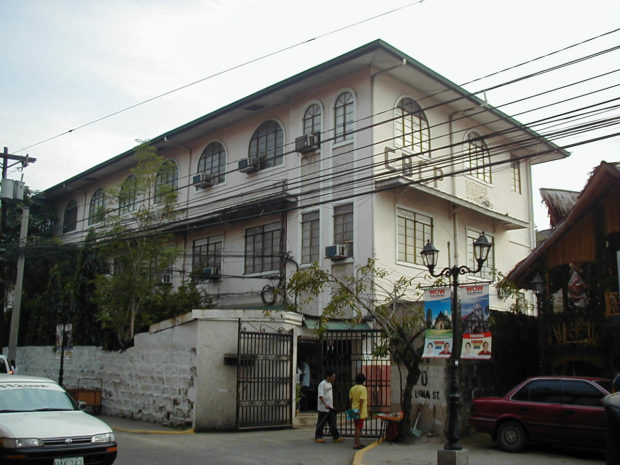
Facade of the Catholic Bishops Conference of the Philippines (CBCP)in Intramuros, Manila City. (File photo from Philippine Daily Inquirer)
MANILA, Philippines— While the Catholic Church prepares its pastoral statement on the upcoming elections, it has directed dioceses to form “circles of discernment” — groups engaged in forums or activities that will help parishioners as they decide who to vote for on May 9.
“The circles of discernment … are a gathering of people, a particular activity wherein parishioners are invited to join so that different speakers who are experts in different fields may discuss the issues,” said Fr. Jerome Secillano, executive secretary of the Catholic Bishops’ Conference of the Philippines (CBCP) permanent committee on public affairs.
Priests have been divided on the issue of how involved they should be in advocating for certain candidates.
But the normative rule, Secillano told the Inquirer on Sunday, was that the pulpit must not be used for political purposes.
This was also the sentiment of Cebu Archbishop Jose Palma who reminded priests not to use the lectern to campaign for the politicians they were backing.
Priests, however, have been given the freedom to support particular candidates in their own personal capacity.
“As a general rule, [Catholic] Church leaders should be nonpartisan. As a bishop, I would tell priests not to use the Church, the pulpit in particular, to endorse a particular candidate,” Palma said in a separate interview.
Active involvement
“The idea is responsible voting and active involvement, especially among laypeople. We use the word responsible voting discernment [where] we study many aspects of the candidate’s life, his or her capacity, track record and programs, among others,” Palma said.
“Laypeople should feel involved. The Pope used the words, ‘should meddle in politics.’ They should campaign for those who they believe will deliver something good for the country,” he added.
It has been a practice of the Catholic Church not to endorse poll candidates or dictate its members’ political choice.
Still, it “must act as a guide” and lead the people “toward a very mature and responsible electoral process,” Secillano said.
“When the Church makes a call for the public to take the elections seriously, the Church has in her mind the future of the Filipinos,” he stressed.
But he clarified that the Church was not “imposing her own agenda. It’s always the Filipino people that the Church is concerned [about].”
The CBCP would soon release a pastoral statement to guide the faithful in choosing candidates for the coming elections. According to Palma, the statement was both for candidates and voters.
“We are in the process of meeting together, fine-tuning it, and eventually coming up with the guidelines,” he said.
Bishop Roberto Gaa of the Roman Catholic Diocese of Novaliches also stressed the importance of Church leaders providing guidance to voters during Mass on Sunday at the Quezon Memorial Circle, hours before the grand “Pink Sunday” rally for presidential aspirant Vice President Leni Robredo and her running mate Sen. Francis Pangilinan.
With a pink tarpaulin as his backdrop bearing the name of Robredo and Pangilinan, Gaa acknowledged in his homily that the Catholic Church may be prohibited from endorsing particular candidates for the upcoming polls.
Very thin line
“I am treading a very thin line,” he said, without directly mentioning Robredo, Pangilinan or anyone from their senatorial slate. “I have said before that what’s important here is having discernment. We should be the lead in the process of discerning who to choose among the candidates.”
Gaa explained that to learn discernment, one must know the acronym “Laser,” which he said referred to Lifestyle, Achievements or Actions, Supporters, Election conduct, and Reputation of each candidate.
“But what is really our discernment? Discernment, for our part here [in the Church], is personal for every priest knowing the importance of how we critique [our choices], with different ways and different processes,” he said.
According to him, these could have “different end results” as well, adding that their participation in picking the “right candidate” would be based on their own personal choices.
“This is not an order from someone higher than us [in the Church]. This is not an order of a priest. This is anchored by our conscience, a result of our prayer and for me, we are having one direction to move toward,” Gaa said. “And I would dare to say that it is the Holy Spirit.”
While he reiterated that Church leaders like him were not supposed to use their own pulpits to campaign for a candidate, Gaa maintained that he, along with other members of the Catholic Church, could freely express their “own choice.”
“And I am elated to observe that we just started organizing ourselves last Tuesday and here we all are now. I am very thankful to all your discernment and to those who continue to accept challenges,” he said.
Although he and other priests were expressing a “collective discernment” by their presence at the rally, Gaa stressed that the Church would remain open to all, regardless of political colors and beliefs.
“As bishop, this is a big challenge, this is a huge challenge to everyone as well. At this point, we can say that we are asking the Lord to help us in our discernment. Because, it doesn’t end after we vote since that should be the beginning for us to help,” Gaa said.
—WITH A REPORT FROM NESTLE SEMILLA
RELATED STORIES
Next CBCP head to laity: Don’t call yourselves Christians if you don’t vote trustworthy candidates